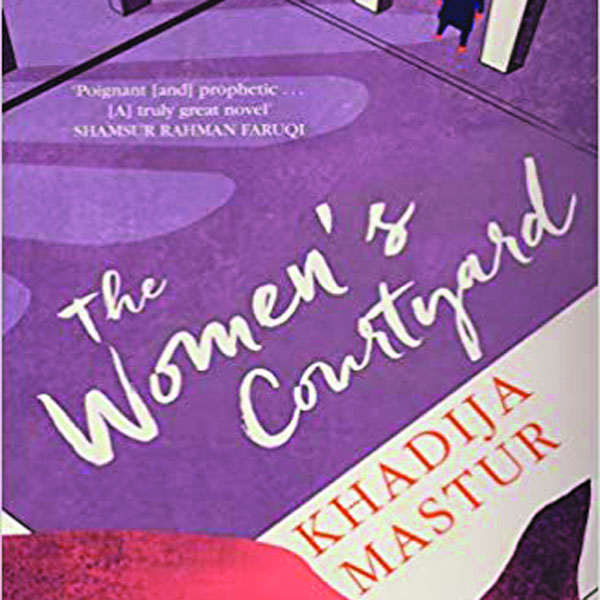The Women's Courtyard
Author - Khadija Mastur
Publisher- Penguin, Rs 499
This translation gives readers access to the frustrations of women who could only receive word on the world outside second-hand, from the men. It also records their refusal to submit to patriarchy, albeit lonely, says Gautam Mukherjee
This is the latest translation into English of Khajida Mastur’s poignant book on the claustrophobia felt by Islamic women restricted within the house set during the run up to and the aftermath of the Partition. For page after page it builds a tension of living in a very proscribed universe.
It records the ignominy of receiving word on the world outside second-hand, based on what the men might have said, the dynamics between the women and servants in the house, their hopes, fears, frustrations and aspirations. There is the radio of course, and newspapers.
There is value in this book in terms of its relentless sociological commentary that is relevant to this day amongst the rank and file Muslim communities certainly, and even in the rigid behavior of most Khap Panchayats and other such organisations amongst the Hindus. A recent stir about Brahminical patriarchy only underlines the issue.
The partition came after the daily struggle between Congress and the Muslim League in the backdrop of World War II, till the British, much weakened, finally retreated in 1947. And yes, the ruling dispensations did change on the subcontinent. This gave power to the men, excited by their emergence into independence, but did little or nothing for the situation of or attitudes towards the women, restricted still to their houses and courtyards.
Daisy Rockwell’s rendition of the book is, as if it was written originally in English, without the awkwardness of a translation from Urdu, a much more flowery language on average.
An earlier translation by Neelam Hussain titled The Inner Courtyard, published by Kali for Women in 2001, did use a more sonorous tone that Rockwell avers was not the writing style of the original.
This version then, a retranslation, has been undertaken by her to expose Khajida Mastur’s “spare and elegant” writing style, this time in English. In this endeavour, The Women’s Courtyard certainly succeeds even though the restrictions of a cloistered existence seem a little dated in this age of the Internet and television.
The only men allowed into the women’s courtyard and house were cousins and other elderly relatives. There is an outside room, off the courtyard, with a service door from the inside for refreshments and the like, and another, leading directly to the outside for the men who came and went.
There is a touch of Anne Frank’s restricted and secret world in this story, with suppressed romances between cousins. Frank and her family were eventually discovered in their hiding place, transported, and eliminated by the Nazis. But, in this story, there is a desolate suicide, that of the protagonist’s elder sister Tehmina, the ending of life seen by the victim, as escape from a kind of prison and a life sentence. Aliya, the heroine of the piece, sees her elder sister’s suicide however, as weakness.
Rockwell, focuses on the feminist leanings of the narrative, remarkable for the milieu and time from which it has come, and likens Mastur, like others before her, to one of the Bronte sisters.
She hastens to add, that though the Brontes too lived circumscribed and extremely short lives, they were certainly free to wander outside in the Yorkshire moors.
But Mastur, who died at 53, said to be meek and unassuming in person, wrote with conviction on patriarchy, classism, chauvinism and misogyny. She saw them as “systemic poisons that destroy and kill women intellectually, emotionally and physically”. Additionally, Mastur points out the role of elderly women like her mother and grandmother in “perpetuating the rigid bonds of patriarchy and class hierarchy”.
Here in The Women’s Courtyard, liberation of sorts comes after the Partition. Aliya, the protagonist, leaves her Indian amours, unrequited as they are, and part of her extended family behind in India. She gets a job outside, once her lower middle class family moves from somewhere in Uttar Pradesh to Pakistan. She becomes the primary breadwinner there, being educated, and is able to come and go at last.
Aliya teaches children during the day, and volunteers at a refugee camp in the evenings. But her mother waits up for her, and complains that she has become like her dead father, always focused on the outside world.
At the refugee camp, after endless years of sheltered domesticity, a well-to-do doctor proposes to Aliya. Tempted though she is at first, she turns him down. What is the point of selling my soul for secure domesticity she thinks? Her dead sister’s one time suitor Safdar appears, fortyish, after over a decade, this time in Pakistan, and proposes to her. She turns him down too. This is the ironic triumph of feminism in The Women’s Courtyard, a lonely refusal to submit to patriarchy. That it flew in the face of a sensitive woman’s natural hopes and desires was just the price that had to be paid.
























